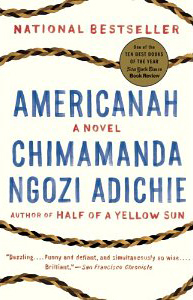Book Notes
 Chimamanda Ngozi Adichie, Americanah: A Novel (New York: Anchor Books, 2013), 588pp.
Chimamanda Ngozi Adichie, Americanah: A Novel (New York: Anchor Books, 2013), 588pp.
Ifemelu remembers the exact day that she stopped speaking with an American accent and reverted to the natural lilt of her Nigerian homeland. No longer would she imitate her Aunty Uju, who had preceded her to America. Whenever Aunty Uju spoke to white Americans in the presence of white Americans, she spoke with an American accent. But that artifice came with a cost — there "emerged a new persona." Ifemelu felt like "America had subdued her."
Ifemelu is the main protagonist and narrator in Adichie's new novel about how race and place shape our personal identities. Immigration intensifies this search for the true self, for it's often a time when we reinvent ourselves, willingly or not, knowingly or not, into new versions of our former selves. This dynamic is further intensified by Adichie's story of a black Nigerian spending thirteen years in white America, and then returning to Nigeria. Along the way she leaves her Nigerian boyfriend and falls in love with black and white American men.
Language is only one of the many cultural codes and clues that Ifemelu must negotiate. She loved Princeton, but had to take a train to Trenton to get her nappy hair braided. Adichie repeatedly construes hair as "the perfect metaphor for race." She challenges us: would Obama be president if his wife Michelle wore an unruly 'fro? The exact color of your skin is just as powerful, and Adichie, who grew up in Nigeria, deconstructs how African Americans and American Africans, as well as whites, play this game.
Wherever she turned, Ifemelu encountered "slippery layers of meaning that eluded her" — music, food, church, school and work. Even one's bearing and demeanor revealed "that fine-grained mark that culture stamps on people." Returning to Nigeria wasn't much easier. "She was no longer sure what was new in Lagos and what was new in herself." At a meeting of Nigerian "returnees" from the west, she feared that she had become the smug cosmopolitan "Americanah" who complained about all the good things they missed. But she couldn't help now seeing Nigeria through American eyes, and some of what she saw was not pretty.
This is a powerful social critique of race, identity and belonging. The NYTs listed it as one of the top ten books of 2013. Adichie's work has been translated into thirty languages.


